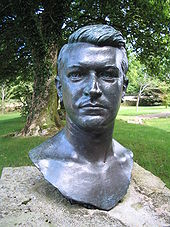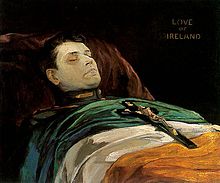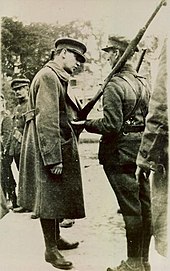Michael Collins (Ireland)
Michael Collins ( Irish Micheál Ó Coileáin ; born October 16, 1890 in Clonakilty , County Cork , † August 22, 1922 in Béal na mBláth , Irish for Mouth of Flowers near Bandon , County Cork) was a leader of the Irish struggle for independence (1919 to 1922 ), a member of the delegation that negotiated the Anglo-Irish Treaty , chairman of the Provisional Government and Commander-in-Chief of the Irish Armed Forces from January 1922 until his assassination .
Origin and youth

Michael John Collins was born in Sam's Cross, near Clonakilty, in County Cork, the youngest of eight children. The family owned land that was relatively sizable for an Irish family in the late 19th century. Collins' early interest in Irish history was encouraged by James Santry, his hometown blacksmith, and Denis Lyons, his teacher at Lissavaird National School and a member of the Irish Republican Brotherhood (IRB). Collins played hurling and was early active in the Gaelic Athletic Association (GAA).
After Collins had attended secondary school in Clonakilty, he went to London in July 1906 , as there was little prospect of professional advancement in his home country. He got a job at the Post Office Savings Bank and lived with his older sister Johanna. During his London years he took an active part in the lives of Irish immigrants. Through his activities in the GAA he met Sam Maguire , who was also from Cork. This convinced Collins in 1909 to join the IRB .
The Easter Rising
Collins returned to Ireland in early 1916. There he quickly came into contact with leaders of the IRB who were planning the Easter Rising against the British. The week following the survey began, Collins spent with Patrick Pearse , Tom Clarke, and the other leaders in the General Post Office in Dublin . The uprising became the military disaster that many expected. Some rebels viewed the Easter Rising as a blood sacrifice to serve as a model for other Irish people. Collins railed against what he considered to be a clumsy and amateurish approach. He did not believe in occupying individual buildings that could hardly be defended and poorly supplied. From this he drew his lessons for the later War of Independence (1919–1921) . There he relied on guerrilla tactics with small, mobile units that struck quickly and then withdrew in order to keep the losses small and to achieve the greatest possible effectiveness.
After the insurgents surrendered, Collins was arrested and interned in Frongoch camp in Wales . There he made many contacts with other Republicans who would later prove to be valuable. It was here that he received his nickname The Big Fellow and demonstrated his organizational and management skills in everyday camp operations. After his release in December 1916, he returned to Ireland and joined - like many survivors of the Easter Rising - the Sinn Féin party . Thanks to his knowledge and skills, Collins rose quickly. In October 1917 he was finally a board member of the party and head of organization of the Irish Volunteers .
Start of the War of Independence
After the end of the First World War, elections for the British House of Commons were due in December 1918 . Like many leading Sinn Féin members, Collins also ran for a seat. He was nominated and ultimately elected in the South Cork constituency. It was an overwhelming victory for Sinn Féin. The party won 73 out of 105 Irish seats. Since the party had announced that it would not take the seats it had won in the House of Commons, the 24 victorious candidates who were not in prison met on January 7, 1919 at the Mansion House in Dublin. There they constituted themselves as the Irish Parliament ( Dáil Éireann ).
In February 1919, Collins helped free Éamon de Valera and several other Sinn Féin members from custody in Lincoln, England . De Valera was elected on April 1, 1919 to succeed Cathal Brugha as head of the provisional government. Collins was of the opinion at the time that the political part of the struggle for Irish independence had more propagandistic than practical value. He considered the armed struggle underground to be more decisive. In this fight he played an increasingly important role in the course of 1919. In the summer of that year he was elected President of the IRB, and in September he took over the role of chief intelligence officer of the IRA, which emerged from the Irish Volunteers . With the new name, the organization wanted to make it clear that it saw itself as the army of the republic that was proclaimed in January 1919. She became the decisive supporter of the fight for independence on the Irish side.
War of Independence
In April 1919, Collins, who had many years of experience as a bank clerk, was appointed Treasury Secretary to the Provisional Government. Under the circumstances of the increasingly brutal war and the constant risk of arrest, in this role he had to act largely from underground. His main task in this situation was to raise funds for the independence struggle. For this purpose, a national bond was put into circulation in August 1919 and financial support came from Irish emigrants in particular from the USA. Despite the immediate ban on borrowing by the British, Ireland alone managed to raise around £ 250,000 in one year.
As head of the IRA secret service, he had founded a commando unit for counter-espionage purposes, which became known as "The Twelve Apostles". It kept the name later when it included more members. When de Valera traveled to the United States for several months in 1919/1920 to solicit political support, Collins also took on a considerable part of his duties.
Because of his role within the Irish Provisional Government, Collins practically led a life on the run. The British had put a sizeable bounty of £ 10,000 for his capture or killing. The construction of his underground network showed its effect in the course of 1920. There have been increasing numbers of police officers and other members of the British administration in Ireland. The retaliation of the probritic auxiliaries and the " Black and Tans " made the argument increasingly brutal. A high point was November 21, 1920, the first Bloody Sunday in Irish history. In response to the killing of 12 British agents that morning, drunken auxiliaries fired into the crowd at a Gaelic football game in Croke Park that afternoon, killing 14 people.
Among the Irish leaders of the time, Collins had two main opponents. One was Cathal Brugha , the dutiful defense minister, but Collins was in fact superior in military terms to influence in the movement (although he was actually "only" IRA chief intelligence officer), since he also chaired the IRB . The other was the head of the Provisional Government (President of the Dáil Éireann), de Valera. The rivalry between the two was also reflected in their nicknames. Because of his tall, lean figure, de Valera was nicknamed "The Long Fellow" in contrast to the "Big Fellow" Collins.
Armistice and the Anglo-Irish Treaty
In the course of 1921, both the Irish and British sides became more willing to negotiate, as both sides saw little opportunity to win the conflict militarily. An armistice was signed on July 11, 1921, and negotiations began soon after to reach a final settlement. The English saw in Collins as the most important negotiating partner, since they saw in him the real leader of the Irish nationalists, although this was officially de Valera. After a brief power struggle between the two, de Valera finally went to London to head the delegation. Collins was refused entry.
After this first round of negotiations was unsuccessful, a second round of negotiations took place in London on October 11, 1921. This time Arthur Griffith was the leader and Collins came as his deputy. Since many English people viewed Collins as a murderer, the reception was rather cool. Over time, Collins became more and more of the real negotiator on the Irish side. The goal of the Irish was an Irish republic. However, the negotiations turned out to be extremely tough and difficult. The Unionists from Ulster were not prepared to reverse the division of the island that had actually taken place in early 1921. In addition, the British were unwilling to accept an Irish republic outside the Empire.
On December 6, 1921, the so-called Anglo-Irish Treaty was finally concluded, which provided for the establishment of an Irish Free State. The six Northern Irish counties were given the right to leave the Free State, which they did immediately. For the purpose of defining the final border, a border commission should be set up. Collins hoped this commission would bring advantages for the new state. The Free State was a Dominion within the Empire with a bicameral parliament. The Irish government should be elected by the House of Commons, the Dáil Éireann.
The treaty brought much of the island independence from Great Britain, but many Republicans saw it as a sell-off of Irish interests. The Dominion status and the oath of allegiance to the British king as well as the rights of the British to use several Irish ports met with particularly strong resistance. De Valera has been accused of shirking the negotiations because he suspected that the outcome would not meet most Irish expectations. Most historians today see this as the most likely explanation for its absence. An exchange of words after the signing of the contract clearly shows what a precarious position Collins put himself personally with the result of the negotiations. A member of the UK delegation, Lord Birkenhead, noted that he may have signed his political death warrant, to which Collins replied, "I may have signed my actual death warrant."
The Provisional Government and the outbreak of civil war

The ratification debate on the Anglo-Irish Treaty clearly revealed the rift that ran through the republican camp. Collins put all his might to support the contract. He thought it was the maximum achievable at the moment. He also feared that if hostilities broke out again, the IRA, weakened by its losses in recent years, would not be able to continue the fight. The supporters of the treaty prevailed in the vote on January 7, 1922 with 64 to 57 votes. Immediately afterwards there was a break within the Dáil and Sinn Féin. Under the leadership of de Valera, the opposing parties left parliament and the party. Arthur Griffith was elected as the new President of the Dáil on January 10th and headed the Council of Ministers of the Irish Republic, while Collins, since the British only recognized a treaty government and not the previous one, formed a new Provisional Government six days later in the he also took over the post of finance minister and which partially coincided with the Griffith administration. In contrast to Griffith's government of the Irish Republic, which had been sought so far, Collins government fulfilled the British claim to a Dominion in southern Ireland , from which the Irish Free State was to emerge after the deadline in December 1922 .
Over the next few months, Collins tried to bridge the gap between supporters and opponents of the treaty in order to save the young Free State from an ordeal. With de Valera, he reached a compromise that enabled the opponents to participate in the Free State's first elections and guaranteed them four ministerial posts in the subsequent coalition government. The republican constitution proposed by Collins, which no longer mentioned the British king, was also intended to force the opposing parties to give in. However, this constitution was rejected by the British because it was in conflict with the Anglo-Irish Treaty.
In April 1922, around 200 IRA members who opposed the treaty occupied the Four Courts courthouse in Dublin. Since Collins wanted to avoid a civil war at all costs, he initially did nothing against the occupation. On June 22, 1922, Henry Hughes Wilson , a retired British general with strong unionist sympathies, was shot dead by two IRA men in London. The English suspected Collins of ordering the murder. They called on the Irish government to end the occupation of the Four Courts. After the occupiers abducted JJ O'Connell, a general in the Free State Army , Collins was forced to act. He opened fire on the Four Courts with two cannons borrowed from the British. This bombardment marked the beginning of the Irish Civil War between the anti-treaty IRA and Free State forces. In order to concentrate entirely on the military struggle against the contracting parties, Collins resigned his government offices on July 12, 1922 and took over the supreme command of the army. She was armed and equipped mainly from British stocks.
Collins' death

At the end of August, Collins went on an inspection trip to County Cork, a stronghold of the contracting parties. On August 22, 1922, he was returning from visiting relatives in Bandon. In the village of Béal na mBláth , he and his motorcade were ambushed by opponents of the IRA. Instead of fleeing in his armored Leyland Eight , he got involved in a firefight. In the half-hour exchange of fire, Collins was fatally hit in the head. He was the only man who died in the attack. To this day it has not been conclusively clarified who fired the fatal shot at Collins. However, documents released in 2014 support the assumption that Denis 'Sonny' O'Neill was the shooter.
Collins in film and literature

Collins' life was filmed in 1996 with Liam Neeson and Julia Roberts in the lead roles by director Neil Jordan under the title Michael Collins .
The novel The Gráinne journals by Robert Coyle (German Herbst in Dublin , Schneekluth, Munich 1996 ISBN 3-7951-1400-4 ) describes the life of Mary Stewart, Collins' lover.
The book The Day Michael Collins Was Shot by Meda Ryan offers an insight into the last days of Michael Collins' life and the circumstances surrounding the assassination attempt in which he fell victim . Poolbeg, Dublin 1989 ISBN 1-85371-738-X .
Publications
- The Path to Freedom . Talbot Press, Dublin, 1922 (New editions: 1968 and 1996)
literature
- T. Ryle Dwyer: Michael Collins. Biography . Unrast Verlag , Münster 1997, ISBN 978-3-928300-62-9 , (old ISBN 3-928300-62-8 ).
- T. Ryle Dwyer: Big Fellow, Long Fellow . Gill & Macmillan, Dublin 1999, ISBN 978-0-7171-2943-0 , (old ISBN 0-7171-2943-8 ).
- T. Ryle Dwyer: Michael Collins and the Civil War . Mercier Press, Cork 2012, ISBN 978-178117-032-8 .
- Tim Pat Coogan: Michael Collins: a biography . Palgrave, 1990. ISBN 0-09-968580-9 .
Web links
- Literature by and about Michael Collins in the catalog of the German National Library
- Newspaper article about Michael Collins in the press kit of the 20th century of the ZBW - Leibniz Information Center for Economics .
- Michael Collins and his fight for a free Ireland
Individual evidence
- ↑ Gunman believed to have killed Michael Collins was granted a military pension . In: The Irish Times , October 3, 2014.
| personal data | |
|---|---|
| SURNAME | Collins, Michael |
| ALTERNATIVE NAMES | Coileáin, Micheál Ó |
| BRIEF DESCRIPTION | Irish freedom fighter |
| DATE OF BIRTH | October 16, 1890 |
| PLACE OF BIRTH | Clonakilty |
| DATE OF DEATH | August 22, 1922 |
| Place of death | at Bandon |





